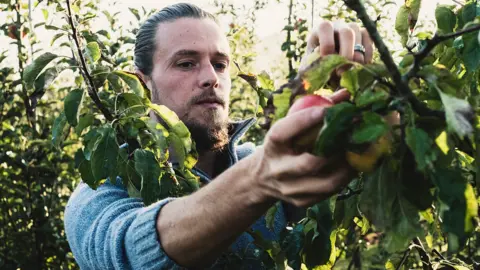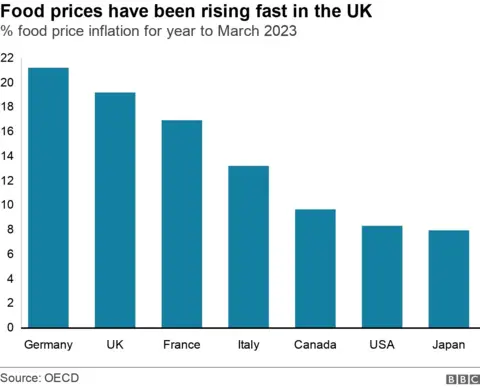More migrant fruit pickers welcome in UK, says PM
 Getty Images
Getty ImagesMore seasonal workers will be allowed into the UK if needed, the prime minister has said after the home secretary said migration must fall.
Rishi Sunak told a gathering of farmers and other food producers an extra 10,000 visas will be made available for the agriculture sector.
This would be on top of the current 45,000 allocated.
But on Monday, Suella Braverman said there was no reason the UK could not train its own fruit pickers.
At a speech, the home secretary said it was "not racist" to want to control borders and her aim was to reduce net migration.
On Tuesday, Mr Sunak said the government was responding to the needs of farmers by offering the extra visas.
Asked by Farming Today on BBC Radio 4 why the number of visas was not higher, Mr Sunak said: "I think the number is appropriate.
"We haven't used the 45,000 allocation last year. Before we start saying we need more it's reasonable to extend the current numbers."
The Department for Environment, Food and Rural Affairs said the extra visa numbers were also offered to the agricultural sector last year.
Food summit
Around 70 leading members of the food industry, including farmers and supermarket bosses, met with the prime minister and his colleagues to talk about how the UK can improve the way it produces and sells food.
It comes against a backdrop of continued high prices, and new research from the consumer group Which? that said the price of some goods had jumped by as much as 25% in April, compared with the same month last year.
Dairy products such as cheese saw the biggest rise, the group said.
Overall, in a survey of the UK's eight largest supermarkets looking at 26,000 products, it said food prices rose more than 17%.
Supermarkets are starting to bring down the prices of bread and butter but Which? said prices remained at "shockingly high levels" compared with last year.
It also found supermarket own-label budget items were up 25% in April compared with the same period 12 months ago.
The consumer group said it was "concerned the voices of millions of people" struggling with soaring food inflation had not been heard at the summit.
"Families up and down the country are facing a daily struggle to put food on the table and it's clear the big supermarkets could...make available a range of healthy budget foods available in all shops," it said.

Earlier on Tuesday, Tesco announced that it was cutting prices of vegetable and sunflower oil, as well as pasta by 15p. But a 500g bag of penne pasta is still 80p - in 2021, it was 50p.
However, Bill Grimsey, the former boss of frozen food chain Iceland, warned: "If anybody thinks prices are going to come down quickly anytime soon, well they're not."
Farmers and businesses have been hit by rising operating costs, in part caused by Russia's invasion of Ukraine.
Other expenses such as shipping costs - which soared during the Covid pandemic - have since fallen but Mr Grimsey said shoppers are unlikely to see the impact of this on the prices they pay.
Fair deal
The government also pledged to put greater emphasis on farmers' interests in future trade deals and said it would review horticulture and egg supply chains to "ensure farmers get a fair price for their produce".
Many farmers have argued that supermarkets are not giving them a fair deal for certain goods, such as eggs.
Ash Amirahmadi, managing director of the UK's largest dairy producer Arla Foods, attended the summit and told the BBC the meeting was a "good start", but added that the government needed to "follow through" on its commitment to prioritise the UK's food industry.

Mr Amirahmadi said burgeoning costs in the sector were not unique to the UK and were about 40% up before inflation first started rising, though he cautioned against a return to the days of cheap milk.
"I expect when we fully come out of this prices will be higher than they were before," he added.
The British Retail Consortium (BRC), which represents retailers, has said they are "doing all they can to keep food prices as low as possible" and called on the government to streamline regulation around recycling, packaging and Brexit to try to bring down prices for consumers.